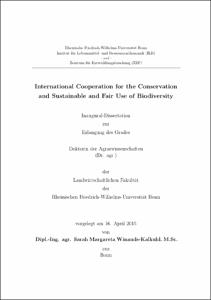Winands-Kalkuhl, Sarah Margareta: International Cooperation for the Conservation and Sustainable and Fair Use of Biodiversity. - Bonn, 2015. - Dissertation, Rheinische Friedrich-Wilhelms-Universität Bonn.
Online-Ausgabe in bonndoc: https://nbn-resolving.org/urn:nbn:de:hbz:5n-41332
Online-Ausgabe in bonndoc: https://nbn-resolving.org/urn:nbn:de:hbz:5n-41332
@phdthesis{handle:20.500.11811/6265,
urn: https://nbn-resolving.org/urn:nbn:de:hbz:5n-41332,
author = {{Sarah Margareta Winands-Kalkuhl}},
title = {International Cooperation for the Conservation and Sustainable and Fair Use of Biodiversity},
school = {Rheinische Friedrich-Wilhelms-Universität Bonn},
year = 2015,
month = sep,
note = {This thesis contributes to the modelling of intergovernmental cooperation for global biodiversity conservation and analyses multilateral cooperation on the genetic resource market. The inter- and transdisciplinary research consists of game theoretic modelling, economic analyses, the study of political and legal documents, as well as the conduct of expert interviews. The game theoretic biodiversity conservation model developed in this thesis considers countries that are heterogeneous in ecosystems and wealth. The ecosystems are characterised by imperfect ecosystem substitutability as well as an ecosystem resilience threshold and provide local as well as global benefits. One of the main findings of the numerical appraisal is that cooperation improves upon the conservation share in the Nash equilibrium and optimal transfers facilitate a large stable coalition. Moreover, it is evinced that established ‘per-member partition functions’ are currently not applicable to the biodiversity conservation game. Based on expert interview results and technical feasibility and political economy considerations, an alternative benefit-sharing rule is derived. It is shown how this rule can be incorporated into the standard game-theoretic framework once countries have gained sufficient information to form expectations about biodiversity benefits. The main finding on multilateral cooperation on the market for physical genetic resources is that eco-regional cooperation and, even more so, a comprehensive global mechanism have the potential to significantly reduce transaction costs for both supplying countries and customers. They can thereby decrease prices for customers and increase demand, conservation levels and providers’ benefits. A case study of the Andean Community’s joint access legislation shows that the member countries realise few of their potential cooperation advantages. Collusion on the physical genetic resource market will not lead to high benefits as market power is limited by substitutes in form of ex-situ resources and freely available genetic information. The economically preferable instrument of a comprehensive global mechanism, in turn, is politically not feasible any time soon due to path dependencies and an arguably narrow understanding of national sovereignty.},
url = {https://hdl.handle.net/20.500.11811/6265}
}
urn: https://nbn-resolving.org/urn:nbn:de:hbz:5n-41332,
author = {{Sarah Margareta Winands-Kalkuhl}},
title = {International Cooperation for the Conservation and Sustainable and Fair Use of Biodiversity},
school = {Rheinische Friedrich-Wilhelms-Universität Bonn},
year = 2015,
month = sep,
note = {This thesis contributes to the modelling of intergovernmental cooperation for global biodiversity conservation and analyses multilateral cooperation on the genetic resource market. The inter- and transdisciplinary research consists of game theoretic modelling, economic analyses, the study of political and legal documents, as well as the conduct of expert interviews. The game theoretic biodiversity conservation model developed in this thesis considers countries that are heterogeneous in ecosystems and wealth. The ecosystems are characterised by imperfect ecosystem substitutability as well as an ecosystem resilience threshold and provide local as well as global benefits. One of the main findings of the numerical appraisal is that cooperation improves upon the conservation share in the Nash equilibrium and optimal transfers facilitate a large stable coalition. Moreover, it is evinced that established ‘per-member partition functions’ are currently not applicable to the biodiversity conservation game. Based on expert interview results and technical feasibility and political economy considerations, an alternative benefit-sharing rule is derived. It is shown how this rule can be incorporated into the standard game-theoretic framework once countries have gained sufficient information to form expectations about biodiversity benefits. The main finding on multilateral cooperation on the market for physical genetic resources is that eco-regional cooperation and, even more so, a comprehensive global mechanism have the potential to significantly reduce transaction costs for both supplying countries and customers. They can thereby decrease prices for customers and increase demand, conservation levels and providers’ benefits. A case study of the Andean Community’s joint access legislation shows that the member countries realise few of their potential cooperation advantages. Collusion on the physical genetic resource market will not lead to high benefits as market power is limited by substitutes in form of ex-situ resources and freely available genetic information. The economically preferable instrument of a comprehensive global mechanism, in turn, is politically not feasible any time soon due to path dependencies and an arguably narrow understanding of national sovereignty.},
url = {https://hdl.handle.net/20.500.11811/6265}
}






